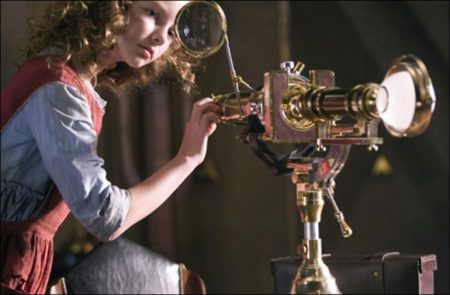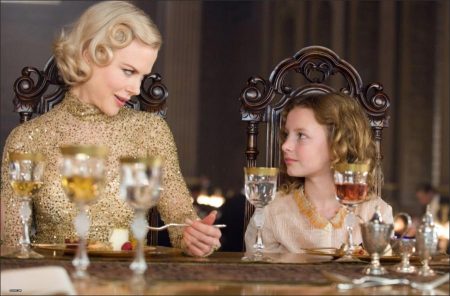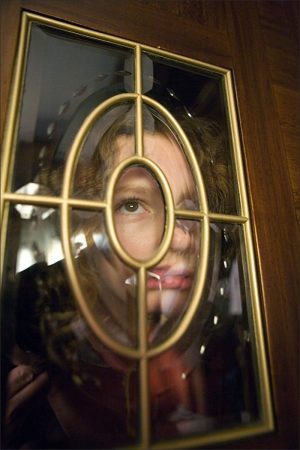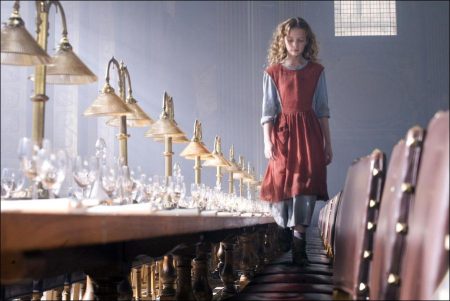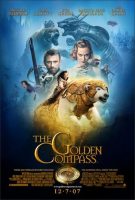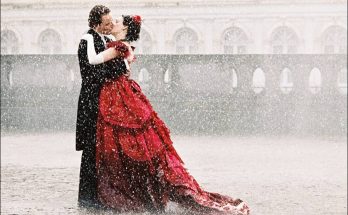The Golden Compass Movie Trailer. Writer / director Chris Weitz encountered the first book in Philip Pullman’s widely read and award-winning trilogy while making his acclaimed film, About A Boy, for which he was nominated for an Oscar for Best Original Screenplay (along with his brother Paul). “I had heard from friends of mine about a fantastic and life-changing British fantasy series that was `written for children but really for adults,’” he recalls. “I was absolutely stunned by the imagination, daring and intelligence of the books. As far as ambition and philosophical depth, they left everything I had read previously in the dust.”
To gain the opportunity to adapt Pullman’s immersive tale for the screen, Weitz presented New Line Cinema with a manifesto describing how he saw the film, and then dedicated the ensuing three years to bringing his vision of the film to life. “It offers everything a filmmaker would be interested in – a compelling story, fascinating characters, psychological and philosophical depth, wonder and the chance to make a beautiful film,” Weitz explains. “It’s a fantastic story, about things that matter, like the human spirit, loyalty, kindness and free will. When you are directing a movie, you have to have utter commitment to every aspect of it, and there was nothing about this project that I didn’t feel absolutely passionate about.”
Like Pullman, Weitz attended an “Oxbridge” college – in his case, Trinity College, Cambridge, where he studied 17th century literature and developed an affinity for John Milton, whose work resonates throughout Pullman’s books. Pullman, in fact, titled his trilogy from the enticing thematic connections between Milton’s mention of “His dark materials” in Paradise Lost, Book II, and “dark matter” – the very essence of the universe:
“Into this wild abyss, the womb of nature and perhaps her grave,
Of neither sea, nor shore, nor fire,
But all these in their pregnant causes mixed
Confusedly, and which thus must ever fight,
Unless the almighty maker them ordain
His dark materials to create more worlds,
Into this wild abyss the wary fiend
Stood on the brink of hell and looked a while,
Pondering his voyage…”
For producer Deborah Forte, the journey to bring Pullman’s novels to the screen had begun nearly 11 years ago when she first read The Golden Compass (called The Northern Lights in the UK) in manuscript form and immediately pursued the rights on behalf of Scholastic Media. “I thought at the time, This is an extraordinary writer, and wherever he’s going, I want to go with him,’” Forte recalls. The Golden Compass unfolds in a world that is, “not traditional fantasy; it’s not traditional science-fiction,” Forte continues. “When people read these books, they are presented with an instantly engaging world that is entirely original and at the same time relatable.”
Pullman’s His Dark Materials trilogy – comprised of The Golden Compass, The Subtle Knife and The Amber Spyglass – became a critical success and publishing phenomenon, selling 14 million copies around the world to date. The trilogy also began collecting awards, including the prestigious Whitbread prize, which no novel for children had ever won previously.
Executive producer Ileen Maisel of New Line Cinema discovered the books and found that a number of her colleagues, including Mark Ordesky and Michael Lynne, had also taken the plunge into Lyra’s world. “It’s a story of a young girl’s journey to self awareness and understanding the price of free will,” Maisel describes, “set against extraordinary worlds of fantasy as well as reality. Philip doesn’t call this a fantasy. Philip calls this a reality novel. That’s the way we look at it, and that’s what’s so exciting about it because Lyra does things that all of us wish we had the ability and the courage to do. And that’s why I think we all relate to her and believe in her.”
The ideal synthesis between material and adaptor had been struck. “Chris Weitz is so smart and so thoughtful,” says executive producer and New Line President of Production Toby Emmerich.”He also has great humanism and artistry paired with a real instinct for making fun, entertaining movies. We got very lucky with Chris and have every confidence that he has made a compelling, exciting film.”
“Everyone was fully prepared – each department and every individual working on this movie understood the material from inception,” says Forte. “They appreciated it. They had a vision for it that dovetailed with Chris’s vision for the movie, and so it was off and running the moment Chris walked into this project.”
Weitz, Forte and the entire filmmaking team found a powerful ally and steadfast resource in Pullman himself. “I’m adapting Philip Pullman,” explains Weitz. “So, while there is some compression involved, my commitment is to carry over the spirit of his vision and this world he has created.”
“I’ve done my part,” says Pullman. “I handed it over to Chris and his team to make the film. I couldn’t have people to trust my story to who were more trustworthy, and I know my story is in good hands.”
Weitz met on numerous occasions with Pullman and discussed the film throughout development and production. Weitz also set sail for Svalbard, Norway – 1000 miles north of Oslo and a key location in the story – where he wrote the bulk of his adaptation.
“I believed in the film’s potential when Chris first turned in his 156-page draft 2 ½ years ago,” recalls executive producer Andrew Miano. “He poured so much of his own heart and soul into the material, along with a deep faith in the universe Pullman created.” Adds producer Bill Carraro, “Chris Weitz adapted the book in such a wonderful manner and carried that dedication and commitment into directing. The writer in him was always helpful to everyone working to put together the movie because he could always focus on the elements that were most important, from design to stunts to acting to effects.
The production would be a vast one, with striking vistas, myriad creatures and next-generation visual effects. But for Weitz, the key factor in his adaptation would always be the truths at the heart of Pullman’s story. “The magic of the piece is as much in the relationships as in the potential for spectacle,” he says. “Though it’s an enormously well-conceived parallel world, it speaks very truthfully about our world, about our lives as children, parents and individuals in society. And although the heroine is a child, there is nothing childish or silly about this story. It must be treated with human sympathy, in terms of the emotions of the characters, and the gulf in scale between the cosmic and the personal must be bridged as well as Pullman bridges it.”
New Line Cinema Production President Toby Emmerich adds, “When I read the book, I fell in love with the relationship between Lyra and Iorek, the armored bear. Chris has beautifully realized this in the film, capturing a great performance from Dakota Blue and marrying it seamlessly with incredible computer technology. It’s an extraordinary relationship that could only exist in Lyra’s world, but it is still very human and very emotional.”
The Golden Compass (2007)
Directed by: Chris Weitz
Starring: Nicole Kidman, Eva Green, Daniel Craig, Dakota Blue Richards, Nonso Anozie, Sam Elliott, Charlie Rowe, Jim Carter, Clare Higgins, Ben Walker, Kathy Bates, Kristin Scott Thomas
Screenplay by: Chris Weitz
Production Design by: Dennis Gassner
Cinematography by: Henry Braham
Film Editing by: Anne V. Coates, Peter Honess, Kevin Tent
Costume Design by: Ruth Myers
Set Decoration by: Anna Pinnock
Art Direction by: Richard L. Johnson, Chris Lowe
Music by: Alexandre Desplat
MPAA Rating: PG-13 for sequences of fantasy violence.
Distributed by: New Line Cinema
Release Date: December 7, 2007
Views: 157
